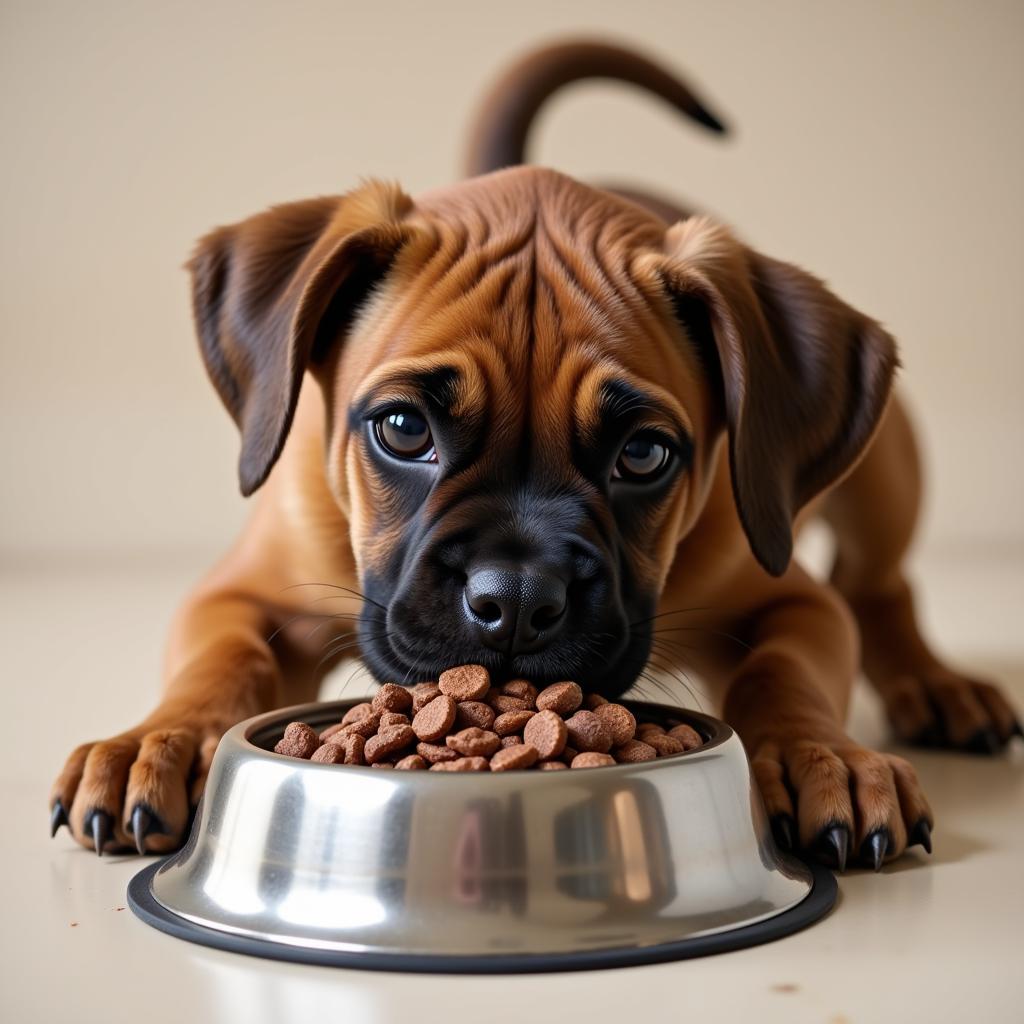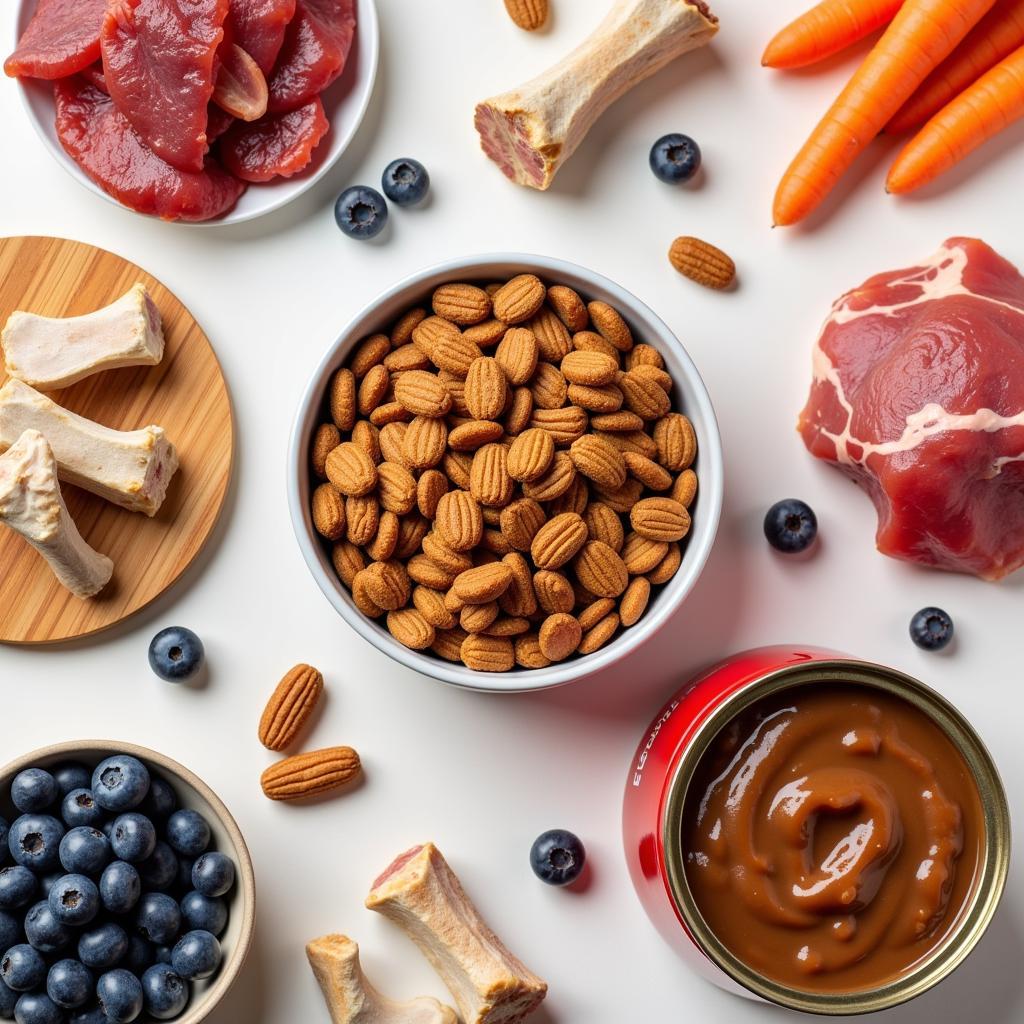Finding the right dog food for your playful Boxer puppy can feel overwhelming. With so many options available, it’s hard to know which one will provide the best nutrition for your furry friend. This comprehensive guide is here to help you make an informed decision, ensuring your Boxer puppy gets the fuel they need to grow into a happy and healthy adult.
Understanding Your Boxer Puppy’s Nutritional Needs
Boxer puppies are a medium-large breed known for their energy and playful nature. This means they need a diet that supports healthy growth and development without overloading their still-maturing digestive systems. Let’s break down the key nutrients to look for:
- Protein: The building block for strong muscles, essential for active Boxer pups. Look for high-quality protein sources like chicken, fish, or lamb as the first ingredient.
- Fat: Provides concentrated energy for all that Boxer puppy zoom! Choose foods with healthy fats like chicken fat or fish oil, important for brain development and a shiny coat.
- Carbohydrates: Offer a source of energy and fiber. Opt for digestible carbs like brown rice or sweet potatoes rather than corn or wheat, which can be harder to digest.
- Calcium and Phosphorus: Crucial for strong bones and teeth, especially important for large breed puppies prone to joint issues.
- DHA: Docosahexaenoic acid, an omega-3 fatty acid, supports cognitive development and vision, key for your Boxer pup to learn all those commands!
 Playful Boxer Puppy Enjoying a Meal
Playful Boxer Puppy Enjoying a Meal
Reading Dog Food Labels Like a Pro
The dog food aisle can feel like reading a foreign language. Don’t worry, we’ll decode those labels:
- Ingredient List: Always check the first few ingredients. Look for named meat sources (e.g., chicken, beef) rather than generic “meat by-products.”
- Life Stage: Make sure the food is specifically formulated for puppies of your Boxer’s breed size (medium-large).
- AAFCO Statement: Look for the statement from the Association of American Feed Control Officials (AAFCO) confirming the food is “complete and balanced” for your puppy’s life stage.
- Guaranteed Analysis: This provides minimum levels of protein, fat, fiber, and moisture. Use this as a guide, but remember ingredient quality is equally important.
Expert Insight: “Don’t be fooled by marketing gimmicks,” advises Dr. Emily Carter, a veterinarian specializing in canine nutrition. “Focus on high-quality ingredients and a formula tailored to your Boxer puppy’s life stage.”
Best Dog Food Options for Boxer Puppies
1. Large Breed Puppy Dry Food: These formulas often feature controlled calcium and phosphorus levels to support healthy bone growth.
- Pros: Convenient, often more affordable, helps keep teeth clean.
- Cons: May be less appealing to picky eaters compared to wet food.
2. Wet Puppy Food: A great option for puppies who need encouragement to eat or prefer a softer texture.
- Pros: High in moisture content, palatable for picky eaters.
- Cons: More expensive, doesn’t promote dental health as effectively as dry food.
3. Raw Food Diets: Gaining popularity, these diets involve feeding uncooked meat, bones, fruits, and vegetables.
- Pros: May offer more natural nutrition, some owners report improved digestion and coat health.
- Cons: Can be expensive and time-consuming to prepare, poses a higher risk of bacterial contamination if not handled properly. Consult your vet before switching to a raw food diet.
 Variety of Dog Food Options: Kibble, Wet Food, and Raw Ingredients
Variety of Dog Food Options: Kibble, Wet Food, and Raw Ingredients
Transitioning Your Boxer Puppy to New Food
Switching your puppy’s food abruptly can cause digestive upset. Follow these steps for a smooth transition:
- Gradual Introduction: Start by mixing a small amount of the new food with your puppy’s current food.
- Increase Ratio: Over 7-10 days, gradually increase the ratio of new food to old food.
- Monitor for Issues: Keep a close eye on your puppy’s stool consistency and energy levels during the transition.
Common Feeding Questions
- How much should I feed my Boxer puppy? Follow the feeding guidelines on your chosen food, but adjust based on your puppy’s age, activity level, and metabolism. Your vet can help determine the ideal feeding amount.
- How often should I feed my Boxer puppy? Puppies need multiple meals throughout the day to keep their energy levels stable. Aim for 3-4 meals per day until six months of age, then transition to 2 meals a day.
Expert Insight: “Remember, each puppy is unique,” reminds Dr. Carter. “Don’t hesitate to consult your veterinarian for personalized feeding advice.”
Choosing the Right Food: A Lifelong Investment
Selecting the right dog food for your Boxer puppy is crucial for their long-term health and happiness. By understanding their nutritional needs, decoding food labels, and choosing a high-quality option, you’re setting the stage for a vibrant and active life.
Remember, your Boxer puppy relies on you to make the best choices for their well-being. If you have any questions or concerns, don’t hesitate to reach out to your veterinarian for guidance.
Frequently Asked Questions (FAQs)
- Can I give my Boxer puppy human food?
- What are the signs of a food allergy in puppies?
- Is grain-free dog food better for my Boxer puppy?
- When can I switch my Boxer puppy to adult dog food?
- How can I prevent my Boxer puppy from becoming overweight?
Need Help? We’re Here for You!
Have more questions about the best dog food for your Boxer puppy? Contact Mina Cones Food at Phone Number: 02437655121, Email: minacones@gmail.com or visit us at 3PGH+8R9, ĐT70A, thôn Trung, Bắc Từ Liêm, Hà Nội, Việt Nam. Our dedicated team of pet nutrition experts is available 24/7 to assist you.